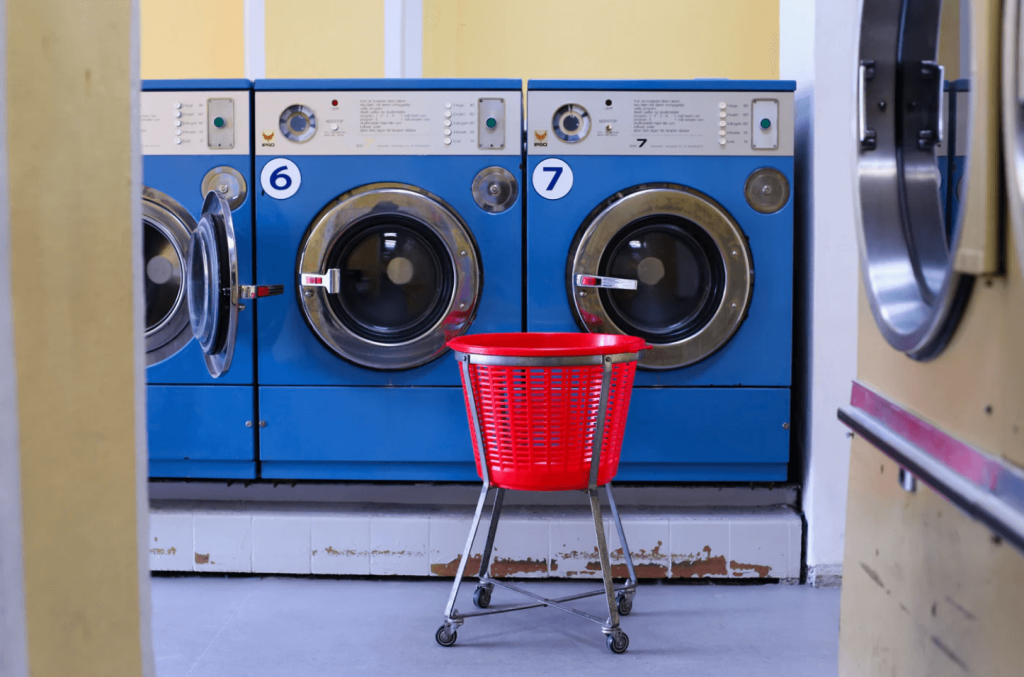
Camping is all fun and games until you realize you’ve dragged dirt, sand, mud, and more into your tent. Disaster alert!
If you’re like me, then you value efficiency, so you wonder: can you wash a tent in the washing machine?
Unfortunately, it is not safe to wash your tent in the washing machine. Washing machine cycles can get rough. This can lead to you damaging the tent’s mesh, seams, or protective coating. Your tent’s fabric may also stretch and rip.
Why It’s Unsafe to Machine Wash Your Tent
Tents can withstand the elements, so it might seem like they can tolerate anything. Sadly, there’s a big difference between the elements and being slammed against the walls of a metallic cylinder for an hour or more.
Fabric Will Stretch
Most modern tents are made from nylon or polyester. Nylon is quite stretchy. If you put a nylon tent in the washing machine, then the tent will likely stretch out and get thinner. This weakens your tent.
Polyester is more fragile than nylon, so there’s a higher likelihood of it tearing.
Single vs Double-Walled Tents
Nylon and polyester tents are available as single or double-walled type tents.
Double-walled tents consist of an inner tent and a rainfly. They are the more common type. You might think it’s safe to machine wash the inner tent because the rainfly is there to protect it regardless, but this is still a mistake.
The inner tent can rip, and that will decrease the quality of the tent. A torn inner tent will lead to you being colder, and there’s a higher chance of bugs getting under the rainfly and in through the holes in the inner tent.
Single-walled tents are lightweight with water and UV-resistant outer walls. As they’re designed to be lightweight, they’re usually thin. Being so thin makes them susceptible to tearing in the washing machine.
Protective Coating Will Get Damaged
Nylon and polyester are covered by a layer of hard, plastic-like waterproof coating, and it can withstand the elements, but it’s not made to withstand a spin in the washer. The waterproof coating will likely shatter, allowing rainwater to seep into your tent.
Many tents also have a UV coating, and the washing machine can damage this, too. UV is a clear coating that’s on the surface of the fabric. Any coating can wash away under the right conditions.
A study on sunglasses shows that UV protection on objects can also become less effective with time, too. The older your tent is, then the easier it’ll be for the washing machine to damage that coating.
Seams and Seam Tape May Rip
In both nylon and polyester tents, the seams are sealed with seam tape. The adhesive on the seam tape can come loose in the washer and expose the holes where the pieces of the tent were sewn together.
Exposed seams will allow water to leak into your tent, and it may also let in tiny bugs, such as ants.
While you can purchase seam tape and repair the seams, the tent will never be as good as it was before it entered the washing machine.
Without the seam tape, your seams may also rip. Not only does this let bugs and water into your tent, but it’s difficult to repair, and you’ll end up buying a new tent.
Mesh Will Rip
Most nylon and polyester tents contain mesh in the windows and doors, and some have fully mesh ceilings, too.
You never want to put mesh in the washing machine, because it’s not strong. The mesh will rip and form large holes, rendering it useless. It’ll let bugs into the tent and make your tent colder.
What About Canvas Tents?
Canvas tents are big, bulky, and can last a decade—it’s easy to think that these would be machine washable. Unfortunately, that’s still not the case.
It’s easy to stretch canvas when wet, and the violent washing machine cycles may do this to your tent. Stretched canvas shrinks when it dries, but if it’s stretched too much, then canvas goes slack. That’ll make for a floppy, weakened tent.
In addition, canvas tents are heavy even when dry. They’ll be too heavy for your machine when wet, and that’ll lead to costly damage to both the tent and the machine.
How to Clean a Dirty Tent Properly
Fortunately, you can clean a dirty tent by hand. It’s not as quick as throwing the tent into the washing machine, but it’s much safer.
All you need is a few supplies and a tent that’s unzipped and inside out. You should also gently shake your tent first to ensure any debris falls out, and then you can begin.
#1. Get Your Supplies
You don’t need too many supplies to clean your dirty tent. You’ll need:
- Lukewarm or cold water
- Fragrance-free dish soap, mild
- Cleaner for outdoor gear; Gear Aid Revivex Pro is excellent
- Soft cloth or sponge
- A large basin or your bath
#2. Spot Clean Your Tent
The first thing you want to do is locate the large stains on the tent fabric. These are the areas that you want to target to ensure they come out fully clean.
Apply some of the soap on your damp sponge or cloth. Gently dab and rub these stains until they’re gone.
# 3. Prepare Your Tub
Lukewarm water is best for cleaning your tent. Fill your basin/bath and add your cleaning product. Each product will have different guidelines on how much to use, so be sure to read the directions.
#4. Start with a Soak in
Now you can leave your tent to soak for a while. How long you leave it to soak depends on the product you’re using, so be sure to follow the directions on the bottle.
#5. Rinse It Out
You don’t want to leave any soap in your tent, so you need to rinse it thoroughly. To do this, drain and clean your tub and then refill it with lukewarm to cool clean water. Immerse your tent in this water and gently move it around until you see the soapy residue in the water.
Drain and refill your tub again, and put your tent back in. If you spot further soapy residue, then you need to repeat this step until you can submerge your tent and have the water stay soap-free.
#6. Let It Dry
Your tent needs to dry naturally, as drying it in the dryer will damage it. Hang your tent up for best results. Ideally, you want to dry it away from direct sunlight.
Check out this video for more details:
How to Clean a Tent That Smells
If you’ve washed your tent and find that it holds a foul odor, then the solution is easy. Get yourself an odor eliminator solution and soak your clean tent in it for five minutes. Gear Aid Revivex Odor Eliminator is a highly rated eliminator that you may like.
If you’d rather rid your tent of odors with household products, then vinegar mixed with water can work instead. Fill a spray bottle with a quarter cup of vinegar to 1 cup of water and spray your tent all over. This should get rid of the stubborn smells.
If you find that your tent smells too strongly of vinegar, then spray some of your favorite fabric freshener on it. However, ensure that the spray contains no corrosive ingredients, as you don’t want something that could damage your tent’s coating.
Cleaning Mildew, Pine Sap, and Zipper Issues on Tents
Sometimes your tent develops further issues while you’re out in the wilderness, and these require a little extra care. Thankfully, none of these issues are too difficult to deal with.
#1. Mildew or Mold
For mildew, you want to use an enzyme cleaner. Rocco & Roxie is excellent for this use.
We also have a more comprehensive tutorial on how to get mildew or mold out of a tent.
#2. Pine Sap
When you have pine sap on your tent, you want to spot clean your tent using water and mineral oil on a non-corrosive cloth or sponge. Alcohol cleaning wipes or hand sanitizer can also work to remove the sap.
Once you remove the sap, you’ll need to clean your tent with water and a tent cleaning solution.
#3. Zipper Problems
Zipper problems are usually caused by dirt caught in the zippers. A toothbrush dipped in soapy water can easily scrub this away. Gear Aid Zipper Cleaner can also help.
#4. Dirty Poles
For dirty poles, wipe down your poles with a cloth. Add some cleaning solution if there are stubborn stains. Ensure you use a non-corrosive cleaning solution.
Generally, most household cleaning products are safe for use on tent poles, but be careful not to get any of the solutions on the tent fabric.
How to Keep Dirt Out Of the Tent
Naturally, things will be much easier if you could just keep as much dirt out of your tent as possible. That way, you only need to wash it once per season, not after every camping trip.
Luckily, implementing a few rules for your trip will help you prevent stains and keep debris out of the tent:
- Don’t wear shoes inside; leave them outside or in the tent’s vestibule
- Keep wet gear outdoors or in the vestibule
- Wipe your shoes (if wearing) on a welcome mat or your socks/bare feet on a towel
- Use baby powder to get dirt and sand off your skin
- Keep your backpack outdoors under a tarp
- Shake your tent to dislodge debris when packing up
- Bring a small dustpan and brush
Summary
Cleaning a tent is a hands-on activity, but it’s not difficult once you get used to it. The most important thing to do here is to take care of your tent and make sure it stays out of the washer and dryer.
Washing your tent once per season and keeping as much dirt out of the tent as possible are musts, too. The cleaner you keep your tent, then the less often you’ll need to wash it.














